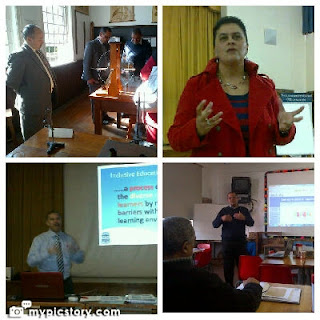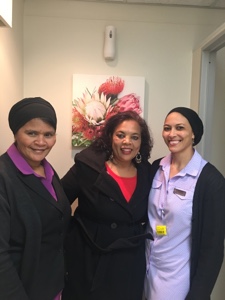 |
| Bottom frames from Left: Brandon and Bevil in action at the Principals' meeting |
Today was one of those wonderfully uplifting days. Our education is undergoing so many changes that you get tired just thinking about the developments taking place. And while I was driving to our Principals' meeting that was being held at the Centre for conservation in Wynberg, I listened to SAFM, one of my favourite radio stations when I am on the road. The National Research Foundation spokesperson was talking about the series of lectures taking place on poverty. I liked what she said about researchers trying to bridge the divide between themselves and the communities they write about. "Community-knowledge building'" seems to be the buzz word out there. Now, this concept is not new to the community of school principals we serve. In fact, today, our meeting was dominated by two presentations facilitated by two of our principals, Bevil and Brandon.
 |
| Here we are, enjoying the guided tour of the Education museum at Centre for Conservation |
Bevil spoke about teacher development and Brandon addressed inclusive education. Here we had two Heads of schools stimulating conversation about two key pillars that education is grappling with. Teachers are struggling to understand the new content they have to mediate and the skills that they have to develop in our children. On the one hand, we have a knowledge economy that requires high level skills sets and individuals who can adapt fast to rapidly-changing environments. In contrast, most of the teachers, including ourselves, hail from a different era, a slower, perhaps a cognitively less demanding environment where your skills set took second place to your positional authority and where you could recycle knowledge that was still relevant. Today this is not the case. Most of what we knew then - specifically the content and the teaching styles - are almost irrelevant - outdated. Coupled with this is a deeply-fractured society. We have frightening high unemployment rates, rising poverty levels and an emotionally and socially-fragmented society. This is the landscape of the teachers in our schools - the very people who are tasked with developing our children to become internationally competitive and to be well-rounded citizens who can contribute to the well-being of our country on all fronts. Sadly, although we acknowledge this, we do very little to help our teachers, other than identifying the problem and offering pathetic solutions. This is exactly where Bevil and Brandon fit in.
 |
| Snapshot of our school principals sitting in benches during the guided tour. |
What was striking about the two presentations are the common threads that ran through them. What became obvious is that both Heads are research-based practitioners and knowledge creators. Throughout the presentations, they asked the hard questions: Are we practising a culturally-relevant pedagogy? Are our schools child-centred ? Are our teachers emotionally and socially literate? Added to this the presentations were peppered with references to Vygotsky and White paper 6, for example - and there were liberal references to their own practices at their schools. Behind all these questions, I also heard these nuances: Are we leading from the front? Are we giving teachers access to knowledge in areas where we have identified deficits and are we mediating this with them, creating space for debates and new learnings, for application and then for reflection? Wow - I thought. This is amazing - peer learning supreme. This is what we call the authentic voice.
 |
| At the Centre for Conservation in Wynberg |
I thoroughly enjoyed travelling with these two school heads as they held these conversations with us. Judging from the relaxed atmosphere and the engagement with their colleagues, we could see that this is what our educators want and need. What added to the richness of the presentations was the calming atmosphere of the Centre for conservation and the guided tour we had of the education museum. Everybody was receptive and there was no space for positional authority and dry, grey spaces where school heads must get reams of powerpoint slides to drive home maintenance and compliance issues. Our school heads can read and we need to encourage this and create the space for more energising, lively debates and conversations. If we want to increase our knowledge and skills base, we need to actively participate in knowledge-creating and sharing events like these. We need to treat our school heads as the giants they are. Perhaps we need to stop plugging real growth by defining the pace and the scope of what schools need. Is it not perhaps time, as the National Research Foundation spokesperson said, that we should engage and listen to all the voices out there and learn alongside them.
 |
| Fun shots |
Imagine the liberating feeling if we were to suspend our fixation with being experts and accept that we have a greater dependence on one another while we wade through all the complexities of change and the challenges that face us in this new era.
So, to Bevil and Brandon, thanks for a glorious reflective and reflexive journey again today...
 |
The Education museum at Centre for Conservation
|








Comments
Post a Comment